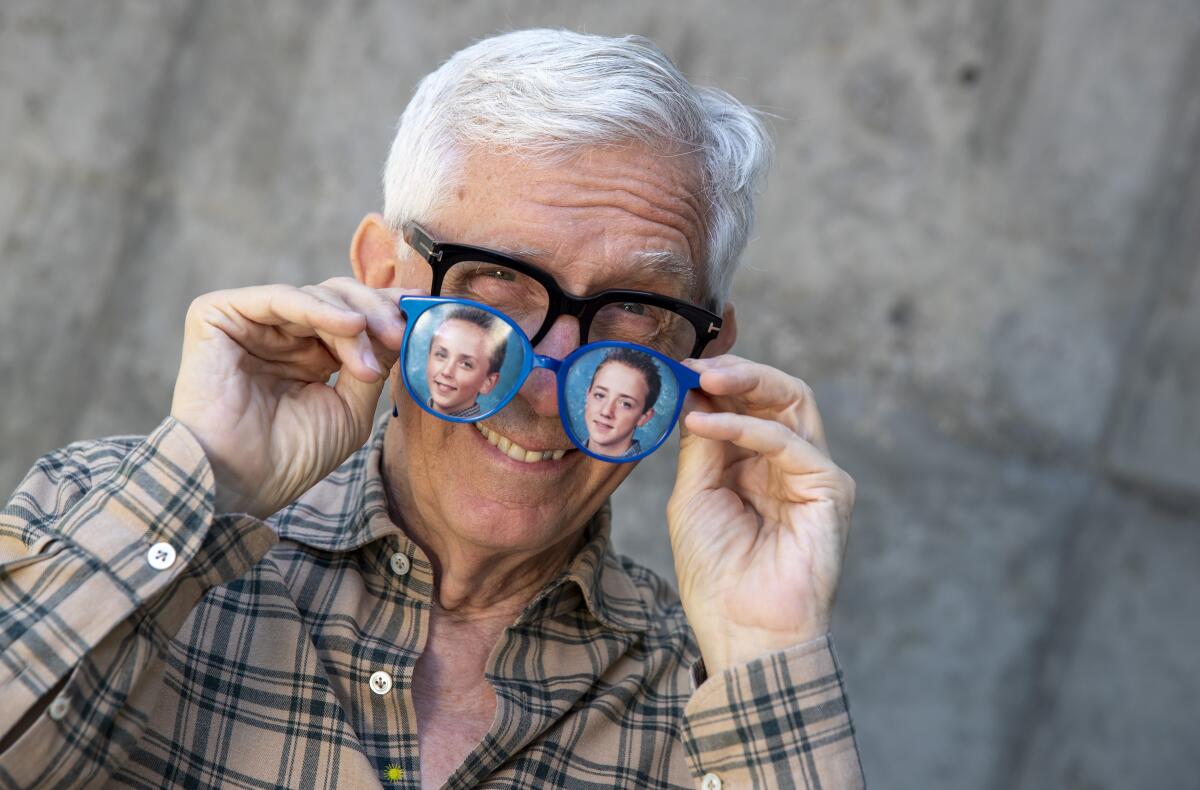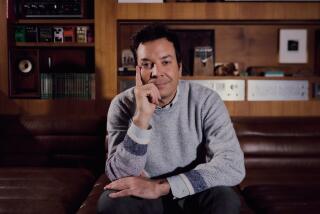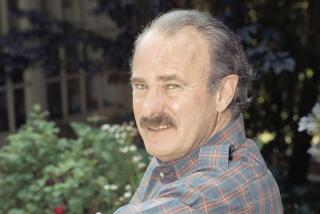Fritz Coleman was a club act who knew nothing about weather. 39 years on, he bids adieu

Have you heard the one about the comedian so funny that a major Los Angeles station hired him as a weatherman even though he knew nothing about weather? The punchline: He became such a viewer favorite that he stayed in the job for almost four decades.
Except itâs no joke.
Fritz Coleman, who has been delivering upbeat and whimsical weather reports for NBC4 for 39 years, will deliver his final forecasts Friday during the 5 p.m and 11 p.m. news. He is retiring to spend more time with his family and to devote more energy to his two favorite hobbies â stand-up comedy and working with charities.
âI look back on my career like a third party and have been thinking about how lucky Iâve been,â Coleman said last week in a phone interview. âIâve been the beneficiary of some astonishing luck. I have absolutely no regrets.â
With silver hair and oversized glasses framing his thin face, Coleman has been one of the most distinctive and popular local news personalities. His departure puts a massive gap in what is arguably the most veteran broadcast news team in Los Angeles â Coleman, co-anchors Colleen Williams and Chuck Henry, and sports anchor Fred Roggin.
Newscasts on local stations including KCBS, KCAL and Fox 11 have instituted changes to broadcasts, including allowing anchors and reporters to work from home and incorporating social distancing
Coleman became a standout on the team not only because of his humorous reports, but also promotional campaigns during the 1980s in which he and Roggin squared off in mock athletic competitions. He also had his own catchy slogan at one time on commercials and billboards: âFritz said it would be like this.â He had his comedy show, âItâz Fritz,â and starred in comedy specials.
Coleman has been contemplating retirement for about a year, although he never imagined that it would be during a pandemic which has required him to broadcast from his home in the Toluca Lake area.
Doing weather reports at home instead of a studio where he has colorful computer maps and state-of-the-art graphics has taken some getting used to. âWhen your workspace is only 20 feet from your bed, it takes a lot of discipline,â he said.
But he has been philosophical about the shift: âI consider quarantine as being a retirement halfway house where I get to see how I would do in these altered circumstances. As it turns out, Iâm doing pretty well. Iâve had a great time, but Iâm looking forward to doing some of the other things I do.â
There were other considerations. âIâve had a couple of minor scares in the past few years â none of them life-threatening. But it gives a lot of free time to think about your mortality. I just thought, âIâm 72 years old and I need to have some quality time and be able to give time to my family while Iâm still healthy enough to do it.ââ
Saying goodbye to Coleman has brought June gloom to his colleagues. Williams became emotional when asked about Coleman.
âFritz is and has been the soul of the newsroom,â Williams said, choking up. âThis has been real hard for me. It is a sad day. We grew up on the air together â we all started within five years of each other. Weâve tried to talk him out of it, but he was determined to go out on his terms.
She added, âWhat you see on the air is what you get in real life. Fritz is the way in real life that he is inside the newsroom. He is the most generous person I know with his time.â

Reflecting on the changes heâs seen in local news since he started in 1982, Coleman said, âItâs gotten so much more competitive. Thereâs two or three times the number of stations now. And the weather report has become more competitive and much more scientific, partly because of climate change. Also, I was hired when the news business was largely personality.â
Colemanâs Hollywood-like entry into the industry came when former NBC4 news director Steve Antonetti saw him perform at the Horn nightclub in Santa Monica. Part of his routine was talking about doing weather reports for Armed Forces Radio when he served in the Navy.
âI didnât know anything about weather, but that didnât seem to bother many officers. It was just to fill time,â he said.
Amused by the routine, Antonetti came backstage and approached Coleman: âHe said, âI have a weird question. Would you have any desire to do vacation relief at Channel 4? I have a weather man, Kevin OâConnell, who hasnât had a vacation in a year and I need some help.ââ
He chuckled. âI was making $45 a night as a comedian, so I said, âWhen can I start?â I had no background in meteorology. They just wanted someone to come in and have fun. Essentially thereâs no weather in L.A. from April to October. After two years, Kevin left and I was bumped up to the main job.â
That path to main weatherman status would not be possible today. âNow to be even considered for the job, you have to be a licensed meteorologist. If I had to do that, I wouldnât have a job. I failed miserably in high school at math and science. Having a meteorologist on staff brings added value instead of a comedian being funny all the time.â
But what Coleman lacked in weather smarts he made up in personality and warmth.
Amid the unrest following George Floydâs death, local TV news channels like KCAL 9, Fox 11, KTLA 5, ABC 7 and NBC 4 are making â and learning from â old mistakes.
âThe best thing about being on TV for a long time in any given market is that you build this familiarity with the audience. The science part didnât happen until I was 20, 25 years into the job. By then I had built up notoriety. People knew who I was, and that was considered valuable enough to keep me on the station. When you come into peoplesâ homes for almost 40 years, you become part of the continuity of their lives. Even if theyâre not paying attention to what youâre doing, when you come on the screen, they can go, âOK, everythingâs OK, my life can continue as normal.ââ
His success on TV also gave his sideline a boost. âComedy is my love, and with the weather job I could do both. One benefited the other. I had the luxury of not having to go on the road like most comedians. I could use my comedy career largely to benefit my nonprofit work. Those proceeds could go to them.â Some of the many causes he supports includes Shelter Partnership, which addresses homelessness, and the Salvation Army.
In a tribute to Coleman, the station is establishing the Fritz Coleman Community Service Award to honor the legacy of his philanthropic work in Southern California.
Coleman already knows what he will miss after he delivers his final forecast during the 11 p.m. newscast.
âI will miss most the ability to be invited into peoplesâ homes at the dinner hour,â he said, âBut Iâm happy to say Iâve reached the emotional point where I can look back with no regrets and see how insanely fortunate Iâve been throughout my career.â
More to Read
The biggest entertainment stories
Get our big stories about Hollywood, film, television, music, arts, culture and more right in your inbox as soon as they publish.
You may occasionally receive promotional content from the Los Angeles Times.











